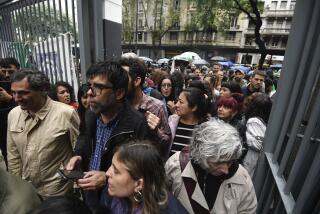Ortega Lifts Pay Ceilings to Ease Nicaragua Labor Strife
- Share via
MANAGUA, Nicaragua — President Daniel Ortega, faced with growing labor unrest, lifted wage ceilings Saturday but ruled out significant mandatory raises in the universal wage scale set by the Nicaraguan government.
In a step away from socialist central planning, Ortega announced that state and private companies will be free to apply profits to “a more flexible wage policy.” The universal scale, legally binding for all employers until now, will remain as a minimum wage for each of 29 job categories, he said.
But the Sandinista leader, speaking two days after peace talks with the U.S.-backed Contras collapsed, said these minimum wages will rise by “insignificant, symbolic” percentages as long as Nicaragua’s economy remains on a war footing.
No ‘Great Illusions’
“We cannot have great illusions,” he said. “Our reality is linked to the war, and whether the war ends does not depend on us but it depends on the United States.”
Inflation fueled by defense spending reached 1,400% last year. Wages have been frozen and have lost about half their purchasing power since the currency was changed Feb. 14. Thousands of construction workers and auto mechanics are on strike, and even the Sandinista-led teachers union is threatening to walk out of the classrooms.
The president fielded questions from several dozen workers at La Perfecta, a dairy plant in Managua’s industrial zone. Socorro Duarte, a cook who earns $14 a month in the company lunchroom, told him: “We hear rumors of a wage increase. This would be fascinating, because we earn so little and prices are going up so fast. Is it true?”
Rules Out Huge Wage Hike
“If we come out now with an increase of 500%, 600% like some union leaders are demanding,” Ortega replied, “we would be fooling ourselves. There would be more inflation.”
“Wages can no longer be raised by decree,” he added. “They can be raised by a company, when that company is profitable.”
The new policy formalizes an established practice in private industry, where employers have exceeded the mandatory wage scale to keep good workers. The scale ranges from $4.16 to $62.75 a month at the current black market exchange rate.
By applying wage freedom to state companies, the government is trying to create an incentive to make them profitable and cut inflationary state spending. Ortega said Saturday that 6,000 public employees have been laid off since March in that effort.
Moved Toward Market Economy
Since taking power in 1979, the Sandinistas have inched away from their original socialist goals toward a market economy. Last year, for example, they freed producer prices for such basic grains as corn and beans.
Because so few companies are profitable, however, the immediate benefit of the new policy for workers will be limited.
Ortega acknowledged that teachers will not benefit. While supporting their demand for a tenfold wage increase as just, he said teachers “have to understand” that spending on the army, farm production and hospital care come first. He said the government has considered closing the schools as an emergency wartime measure.
The president said the breakdown of peace talks with the Contras last Thursday left Nicaragua “in a very difficult situation.” He said the Sandinista army would maintain a unilateral halt of offensive operations until June 30 but fight back if attacked.
‘Maximum Combat Capacity’
“We a ready to continue negotiating, but we will maintain our maximum combat capacity,” he declared.
Ortega accused the Reagan Administration of instructing rebel negotiators to break off the talks and not accept a date for resuming them. “The plan of the United States was to kill the peace plan, to burn it,” he said.
Rebel negotiators charged Friday that Gen. Humberto Ortega, the president’s brother and chief Sandinista negotiator, had threatened them with death at the end of the talks.
President Ortega said his brother became angry when the rebels tried to get up from the negotiating table and leave Managua without setting a date for complying with an earlier pledge to free 66 war prisoners.
More to Read
Sign up for Essential California
The most important California stories and recommendations in your inbox every morning.
You may occasionally receive promotional content from the Los Angeles Times.










